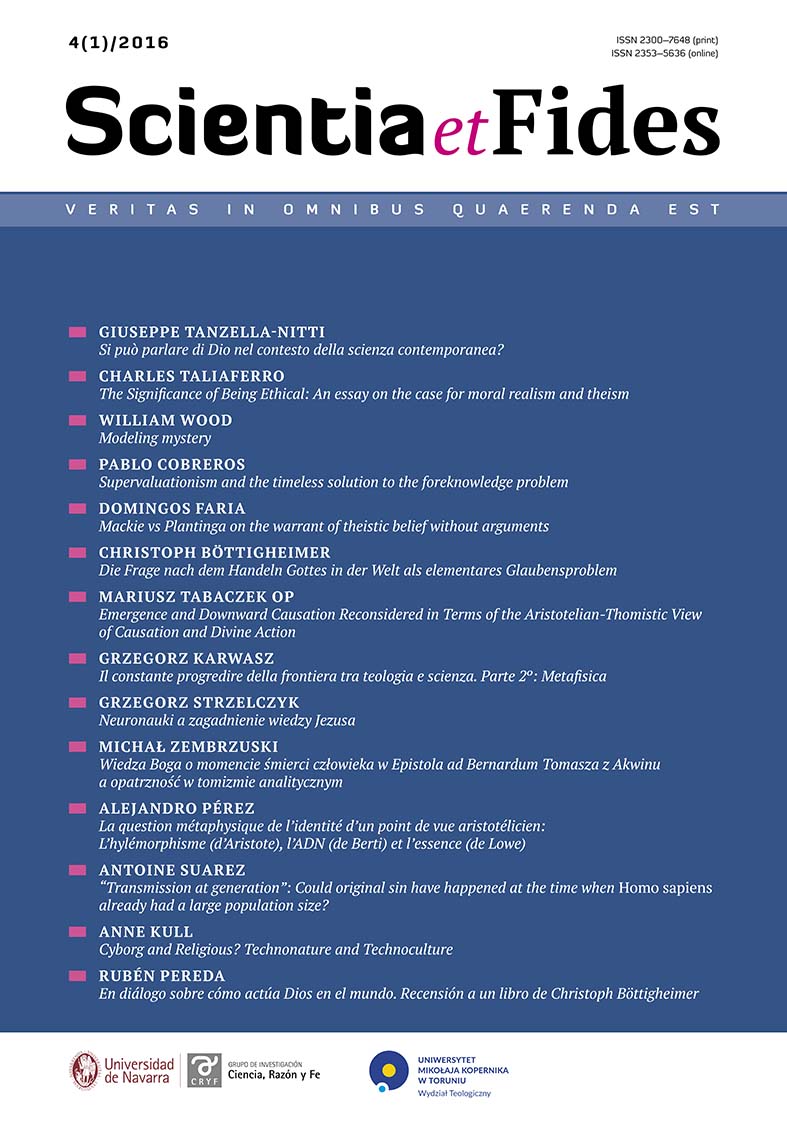Mackie vs Plantinga on the warrant of theistic belief without arguments
Słowa kluczowe
Epistemology of Religious Belief, Warrant, Theistic Belief, Natural Theology, Mackie, PlantingaAbstrakt
My aim in this paper is to critically assess two opposing theses about the epistemology of religious belief. The first one, developed by John Mackie, claims that belief in God can be justified or warranted only if there is a good argument for the existence of God. The second thesis, elaborated by Alvin Plantinga, holds that even if there is no such argument, belief in God can be justified or warranted. I contend that the first thesis is plausibly false, because belief in God is not just like a scientific hypothesis, and the second thesis is likely true if epistemic externalism is the correct view. However, even if the second thesis is true, I argue that to work on good arguments for God’s existence is unavoidable in order to cope with a new version of the Great Pumpkin objection, as well as to achieve other relevant purposes such as to convince rational observers outside the theistic community that belief in God is likely justified or warranted.
Bibliografia
Alston, William (1991) Perceiving God: The Epistemology of Religious Experience. Cornell University Press.
Beilby, James (2007) “Plantinga’s Model of Warranted Christian Belief”. In: Alvin Plantinga, ed. Deane-Peter Baker, 125–165. Cambridge University Press.
Bergman, Michael (1997) “Internalism, Externalism, and the No-Defeater Condition”. Synthese, vol. 110: 399–417.
Bergmann, Michael (2012) “Rational Religious Belief without Arguments”. In: Philosophy of Religion: An Anthology, eds. Louis Pojman & Michael Rea, 534–549. Wadsworth Publishing.
Dawkins, Richard (1995) “A Reply to Poole”. Science and Christian Belief, vol. 7, n. 1: 45–50.
DeRose, Keith (1999) “Voodoo epistemology”. Unpublished manuscript, <http://pantheon.yale.edu/~kd47/voodoo.htm>.
Draper, Paul & Dougherty, Trent (2013) “Explanation and the Problem of Evil”. In: The Blackwell Companion to the Problem of Evil, ed. Daniel Howard-Snyder.
Evans, Stephen (2011) “Religious Experience and the Question of Whether Belief in God Requires Evidence”. Evidence and Religious Belief, ed. Kelly James Clarck, 37–51. Oxford University Press.
Fales, Evan (2003) “Critical Discussion of Alvin Plantinga’s Warranted Christian Belief”. Noûs, vol. 37: 353–370.
Greco, John (2008) “Friendly Theism”. In: Religious Tolerance through Epistemic Humility, ed. James Kraft, 51–58. Ashgate.
MacIntosh, J.J. (2000) “Locke, Plantinga, and the A/C model”. In: Papers from the book symposium on Alvin Plantinga’s Warranted Christian Belief. <http://people.stfx.ca/wsweet/Plantinga-MacIntosh.html>.
Mackie, John (1983) The Miracle of Theism: Arguments for and Against the Existence of God. Oxford University Press.
Martin, Michael (1990) Atheism: A Philosophical Justification. Temple University Press.
Miller, Christian (2005) “Defeaters and the Basicality of Theistic Belief”. In: Basic Belief and Basic Knowledge: Papers in Epistemology, ed. Ron Rood, 147–176. Ontos Verlag.
Moser, Paul (2008) The Elusive God: Reorienting Religious Epistemology. Cambridge University Press.
Oppy, Graham (2009) Arguing about Gods. Cambridge University Press.
Plantinga, Alvin (1993a) Warrant: The Current Debate. Oxford University Press.
Plantinga, Alvin (1993b) Warrant and Proper Function. Oxford University Press.
Plantinga, Alvin (2000) Warranted Christian Belief. Oxford University Press.
Plantinga, Alvin & Tooley, Michael (2008) Knowledge of God. Blackwell Publishing.
Plantinga, Alvin & Boyce, Kenneth (2012) “Proper Functionalism”. In: The Continuum Companion to Epistemology, ed. Andrew Cullison, 124–140. Continuum Press.
Plantinga, Alvin (2015) Knowledge and Christian Belief. Eerdmans Publishing Co.
Scott, Kyle (2014) “Return of the Great Pumpkin”. Religious Studies, vol. 50: 297–308.
Sennett, James (2003) “Reformed Epistemology and the Rationality of Theistic Belief”. In: God Matters: Readings in the Philosophy of Religion, ed. Ray Martin, 219–231. Longman.
Sobel, Jordan (2003) Logic and Theism: Arguments For and Against Beliefs in God. Cambridge University Press.
Stump, Eleonore (2010) Wandering in Darkness: Narrative and the Problem of Suffering. Oxford University Press.
Swinburne, Richard (2001) “Plantinga on Warrant”. Religious Studies, vol. 37: 203–214.
Swinburne, Richard (2004) The Existence of God. Oxford University Press.
The World Factbook 2013-14. Washington, DC: Central Intelligence Agency, 2013, <https://www.cia.gov/library/publications/the-world-factbook/index.html>.
Wilson, Edward (1978) On Human Nature. Harvard University Press.
Wolterstorff, Nicholas (1988) “Faith”. In: The Routledge Encyclopedia of Philosophy, <https://www.rep.routledge.com/articles/faith/>.
Wunder, Tyler (2007) Warrant and Religious Epistemology: A Critique of Alvin Plantinga's Warrant Phase. Boston University.
Zagzebski, Linda (2002) “Plantinga’s Warranted Christian Belief and the Aquinas/Calvin Model”. Philosophical Books, vol. 43: 117–123.
Pobrania
Opublikowane
Jak cytować
Numer
Dział
Licencja
CC BY ND 4.0. Posiadaczem prawa autorskiego (Licencjodawcą) jest Autor, który na mocy umowy licencyjnej udziela nieodpłatnie prawa do eksploatacji dzieła na polach wskazanych w umowie.
- Licencjodawca udziela Licencjobiorcy licencji niewyłącznej na korzystanie z Utworu/przedmiotu prawa pokrewnego w następujących polach eksploatacji: a) utrwalanie Utworu/przedmiotu prawa pokrewnego; b) reprodukowanie (zwielokrotnienie) Utworu/przedmiotu prawa pokrewnego drukiem i techniką cyfrową (e-book, audiobook); c) wprowadzania do obrotu egzemplarzy zwielokrotnionego Utworu/przedmiotu prawa pokrewnego; d) wprowadzenie Utworu/przedmiotu prawa pokrewnego do pamięci komputera; e) rozpowszechnianie utworu w wersji elektronicznej w formule open access na licencji Creative Commons (CC BY-ND 3.0) poprzez platformę cyfrową Wydawnictwa Naukowego UMK oraz repozytorium UMK.
- Korzystanie przez Licencjobiorcę z utrwalonego Utworu ww. polach nie jest ograniczone czasowo ilościowo i terytorialnie.
- Licencjodawca udziela Licencjobiorcy licencji do Utworu/przedmiotu prawa pokrewnego nieodpłatnie na czas nieokreślony
PEŁEN TEKST UMOWY LICENCYJNEJ >>
Statystyki
Liczba wyświetleń i pobrań: 824
Liczba cytowań: 0



